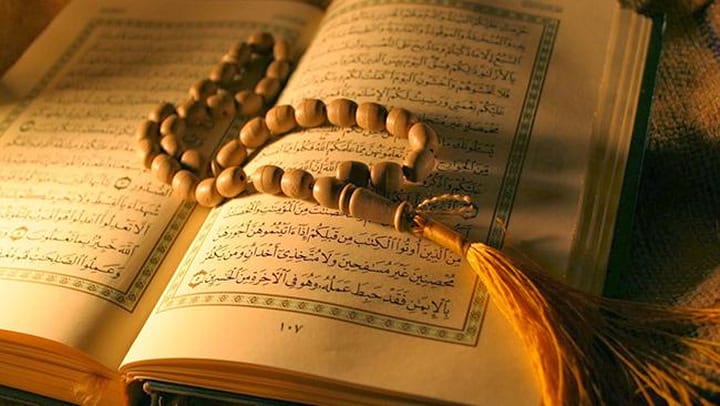The Holy Quran is the Muslims’ Holy Book, or Scripture. It provides a comprehensive theological philosophy and lays down the law and commandments for them, as well as codes for their social and moral behaviour. The Quran is written in Arabic. It is a collection of the Holy Prophet Muhammad’s (P.B.U.H) spoken revelations during a twenty-three-year period.
The Holy Quran is divided into 114 Chapters, each of which has its own set of verses. The chapters (Arabic: Surah) vary in length, with some containing only a few lines and others spanning many pages. Over the past 1500 years, the text of the Holy Quran has remained untouched. Hundreds of millions of copies of the Quran are in circulation around the world. They’re all the same today, down to the last letter. And this is not surprising, given that God says in the Holy Quran that He will preserve the book Himself: “Surely it is we who have revealed the Exposition, and surely it is we who are its guardians”
The Quran is the Word of God, according to Muslims, and it contains all of mankind’s guidance. The Quran spends a lot of time talking about God, His qualities, and man’s relationship with Him. It also includes instructions for its followers, historical records of particular prophets and peoples, grounds for believing Muhammad as a real Prophet, as well as good news for believers and warnings for unbelievers.

The names of the Holy Quran and its characteristics:
Other names of the Quran:
The Qur’an is known by many other names. However, it goes without saying that “Qur’an” is the most often used name. This is mentioned in the Qur’an: “Most certainly, it is a most honourable Qur’an (recited)” (al-Waqiah 56:77)
1. Al-Kitab: meaning the Qur’an
This is the Book: there is no doubt about it. (al-Baqarah 2:1–2).
2. Al-Furqan:
meaning the Criterion for right and wrong, it was given this title because it differentiates between the truth and false, the lawful and unlawful.
3. Adh-Dhikr:
which means a reminder, to remember. The Qur’an was given this title because it is a reminder of Allah.
Indeed it is We, We Who sent down the Reminder in parts, and it is indeed We Who are its Guardian (al-Hijr 15:9).
4. Al-Huda:
meaning guidance. The Book of Allah was given this name because it guides the people to the path of truth.
“…as guidance for the people…” (Al Imran 3:4).
Allaah also described the Quran with many attributes (and adjectives) among which are: Noor (Light), Shifaa’ (Cure), Rahmah (Mercy), Maw’idhah (Admonition), Mubaarak (Blessed), Mubeen (Clear), Bushrah (Glad Tiding), ‘Azeez (Honourable and Respected), Majeed (Glorious), Basheer (Glad Tiding), Majeed (Glorious), Nadheer (Warner), and At-Tanzeel (The Revelation). However, the most well-known names are Al-Qur’aan and Al-Kitaab.
The characteristics of the Holy Quran:
1. The Quran is written in Allah’s own words:
The Holy Quran is the only book that may claim to be written in Allah’s words. Through the Holy Prophet, this book depicts a relationship between man and God. This Book, as the Book of Allah, has been elevated to the point that no one can assess it.
2. Its Words are wonder:
The Quran’s words in the form of verses are in such a form that no one can claim to have constructed them, and this is the tremendous miracle that Allah has announced in the Holy Quran. It is also true that no creature’s brain can match Allah’s intelligence as the all-knowing Creator.
3. The Quran is Concise:
The Quran’s subject matter has been described in such a way that it logically explains every relevant topic. Furthermore, unnecessary and irrelevant information has been omitted. There is a recurrence of certain events that have occurred in previous generations. These events have a direct impact on and relationship with the current situation.
4. The Subject has Depth:
The Holy Quran’s language is simple, but the words have a lot of depth to them. Every verse has a direct connection to current events and will continue to do so until the Doom! S Day. Furthermore, each verse contains a clear directive for man’s life.
5. The Holy Quran is a Revolutionary Book:
It is an antidote to a life of boredom, sluggishness, weakness, and dishonour. It guides Muslims toward advancement and change. The Quran defines progress as economic and social progress, and it forbids Muslims from remaining slaves to others. The Quran commands them to engage in Jihad in order to free themselves from slavery and bring about a social revolution in the world until they gain control of the entire universe. They have been given orders to destroy the forces of Shirk and bring down non-Muslim great powers until they accept Islam.
6. The Holy Quran is the Social Life Curriculum:
The Holy Quran covers all aspects of social life, beginning with family and progressing through education, politics, and economics to religion. The Quran examines all of life’s social institutions, including the husband and wife relationship and the delicate links in which they have been bound. The Holy Quran tackles all economic topics, both clean and impure, and draws a clear distinction between Muslims and non-Muslims. There is a parent-child relationship, a neighbor-hood principle, an old-and-young relationship, a ruler-and-ruled relationship, and everything else that happens in man’s existence.
7. The Holy Quran is a Righteousness Guide:
The Holy Quran describes two paths in this universe. One path goes to hell. This path takes you through the acts, attitudes, and beliefs that Allah has banned. The alternative path leads to Heaven through Allah’s and the Holy Prophet’s prescribed beliefs and behaviours. Our book serves as a true guide on what is right and bad for man on this planet.
8. There are no doubts in this book:
There are no doubts or suspicions in this book. It is free of all inaccuracies and lies. In both words and deeds, this book is accurate. Everything that has been said is devoid of all proofs and experiments. If somebody has any doubts regarding the Book, it is because he has doubts in his mind. If he tries to identify errors in this Great Book, it indicates that he has been led astray and has strayed from the proper path.
The Importance of the Holy Quran:
Muslims believe that the Quran is significant because it is a Divine revelation, meaning that the angel Gabriel delivered the book from God to the final Prophet, Muhammad (peace be upon him). The Quran is God’s words and Divine counsel for mankind. Muslims believe that the Quran holds enormous weight and impact since it is the word of the Supreme Lord. The laws it establishes are the means by which one can obtain Allah’s pleasure and paradise. The Majestic Quran has seven unique traits and benefits that make it a unique and essential book:
1. The Quran clarifies the meaning of life
Muslims believe that the Quran is the outcome of Divine inspiration rather than man’s efforts. The Divine book emphasises the importance of worship, recollection, and obedience in healing the damaged bond between Allah and humanity. The goal is to increase Allah’s honour. Regardless of the topic matter, one theme emerges repeatedly: surrender, commit, and submit yourself completely to the Loving Lord, and you will be assured of redemption, paradise, and salvation from the horrors of Hell. It emphasises Paradise as the long-term benefit of religion and good deeds, while declaring Hell as the result of unbelief and a bad lifestyle.
2. The Oneness of Allah is taught in the Quran
The oneness of Allah, Allah’s guidance through prophets, and the resurrection, or life after death, are the three major principles taught by the Quran. These ideas shape the worldview of their adherents and the reality of human life. This kind of thinking is the key to living a happy and healthy life. As it traces the history of human disobedience from Adam to Jesus and finally to the Messenger himself, it warns us of the severe repercussions of unbelief.
4. The Prophet is portrayed in the Quran as the ideal role model
Muhammad (peace be upon him) is depicted in the Quran as a human role model, a living embodiment of the spirit of goodness, justice, and Divine love. Humanity’s role model, imparting the Divine words that produce such pure, perfect, and beautiful human beings.
6. The influence of the Quranic teachings on daily life
Bad behaviour, the consumption of alcohol and narcotics, selfish habits like as sexual immorality and adultery, gambling and taking an interest in business, envy, backbiting arrogance, and anger are all prohibited in the Quran. ‘Give up these for sanity and happiness,’ the Quran instructs, because individuals who engage in these vices are bound in a degrading circle of evil that makes their own and others’ lives miserable.
What are our duties toward the Quran?
* As Muslims, our first duty is to affirm that the Quran’s truths are correct. Then there are the additional responsibilities, such as reading it, comprehending its meaning, following its directions, and ensuring that its high principles are upheld in our lives as individuals and as a society.
* Reading the Quran by gazing at the text, save when doing prayers, is more virtuous because it involves both the eyes and the mouth. It’s also better suited to contemplation. Only the tongue is involved when memorising the Quran. It is obligatory to read the Quran while facing the Qiblah, wearing clean clothing, and sitting properly.
* The majority of scholars consider reading the entire Quran in a month to be a good act. Some people like to read it in a year, in 40 days, or even in a week. However, reading the entire Quran in fewer than three days is not recommended because one cannot ponder about its meaning when reading it quickly and pronunciation errors are probable.
-The following is stated about the virtues of reading the Quran in the hadiths:
1- “The example of a believer who recites the Qur’an and acts on it, like a citron which tastes nice and smells nice. And the example of a believer who does not recite the Qur’an but acts on it, is like a date which tastes good but has no smell. And the example of a hypocrite who recites the Qur’an is like a sweet basil which smells good but tastes bitter. And the example of a hypocrite who does not recite the Quran is like a colocynth which tastes bitter and has a bad smell.”
2- “The fasting and the Quran will intercede for a person on the Day of Judgment. The fasting will say: O my Lord! I prevented him from eating and lustful things during the day. Accept my intercession for him.”
To summarise, the Quran is the most important text in the world for Muslims everywhere. It provides Muslims with teachings and direction on how to live their life. Although the Quran is not a book of science or medicine, it does contain counsel for spiritual and physical well-being. Following God’s commands and memorising Quran verses will assist us in leading a healthy lifestyle.



